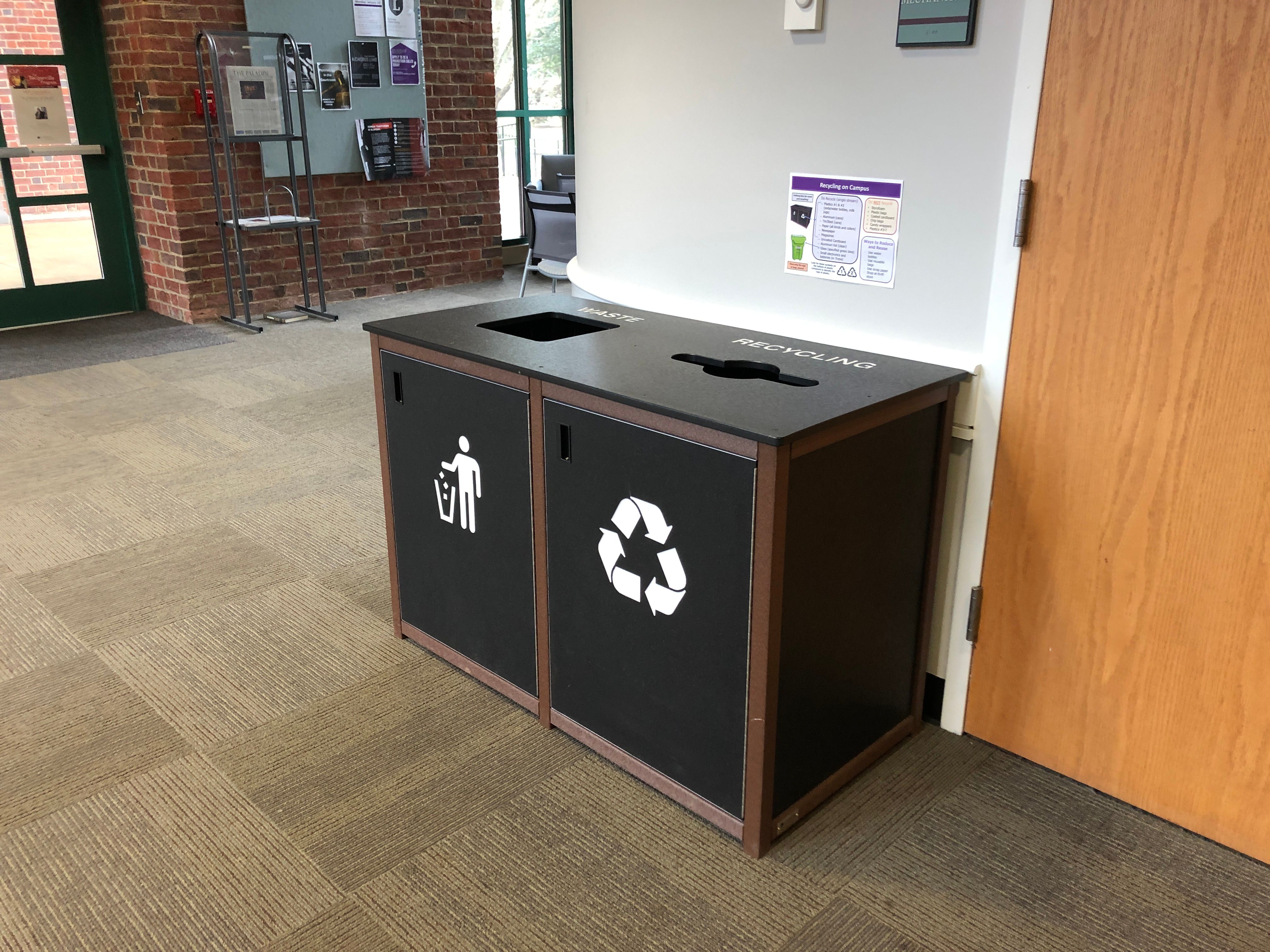Furman University has long been one for catering to environmental concerns, whether it be to the needs of local wildlife on campus, or ensuring that trash is recycled and prepared for reuse. But recently, Furman took new steps to produce a healthy, sustainable university.
Earth and Environmental Sciences professor Weston Dripps has been working with the head of custodial, Jim Benes, in analyzing the university waste stream. Collaborating together, they have been searching for ways to not only reduce waste, but improve recycling efforts. They came up with a new system that can accomplish these tasks efficiently.
Previously, the custodians who routinely take care of Furman would opened every individual classroom and faculty office, pull the plastic liner and garbage/recycling from the bins, and place a new plastic liner in the bin. There were three different bin types: waste, paper, cans/bottles. Daily, these bins were all emptied. Faculty offices generally contained just one single bin in need of emptying. The issue was that even if there was a small amount of waste in the bins the liners were changed daily. According to Dr. Dripps, this caused “significant amounts of unnecessary plastic liner waste being landfilled in this process.”
To put things into perspective, for faculty offices alone, over 30,000 liners were landfilled during the academic year, and an additional 30,000 plastic liners for the classrooms.
Dripps categorized this process as “wasteful and inefficient.” Expressing care and concern for their labor, he added that the process “consumed a good chunk of the custodial staffs’ shifts. This limited their time
available to tend to other needed cleaning efforts ([like] vacuuming offices, sweeping and cleaning hallways / classrooms, handling recycling) and supporting new initiatives ([like] composting paper towels in the bathrooms).”
But Furman workers decided to handle the situation in a way that not only produces benefits for all camps, but does so in the most efficient way possible. In an effort to reduce Furman’s waste stream, save the university money, better streamline the process and provide necessary time for the staff to address other cleaning needs and support, Dripps’ and Furman’s sustainability team attacked the situation from multiple angles.
First, they removed the removed the trash and recycling bins from the classrooms and set up centralized hallway trash/recycling stations. They did this over fall break. Dripps stated that so far it “seems to be going reasonably well.”
He expressed a desire for the students to “continue to do their part by taking out what they bring in and helping keep the classrooms’ clean.” He added, “We realize the slight inconvenience, but feel if students bring in things that generate garbage into a classroom, it seems reasonable to ask them to take it out when they leave and deposit in nearby hallway bins. We appreciate support on this initiative!”
Second, the initiative removed trash cans provided by Furman from faculty offices and provides centralized trash/recycling bins in department suites. Faculty will have their own trash cans in their offices, but will now be responsible for emptying these into the centralized department bins. In the past, they have successfully piloted the approach in multiple different departments over the past couple years .
Finally, the green effort addresses composting paper towels in the bathrooms. According to Dr. Dripps, “ 99% of the waste being generated in the bathrooms is paper towels which we can compost here on campus.” They have previously been piloting paper towel composting successfully in Johns and Furman Halls this past year. They intend to expand this initiative into the other academic buildings this spring.
Benes, the Custodial Manager, weighed in on the recent initiative. “This has been an ongoing problem and concern for years and I feel going to centralized trash is the solution. The custodial staff opens every door every day and pulls the trash liner. Most times only minimal trash items are in the can and if any food item is present the liner must be pulled. This effort will save my department’s budget significantly and reduce unnecessary trash liners in the landfill.”
Multiple faculty departments are collaborating to produce results that appease everyone from all ends. Furman student sophomore Daniel Bernal (‘21) posited his thoughts on the issue. “In theory, I think it looks like a solution. I just hope it works out in a way that not only makes things easier on everyone, but most importantly, does the most good for everyone collectively, despite short term work.”
